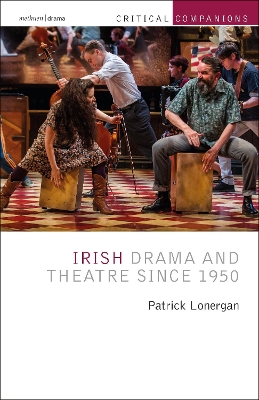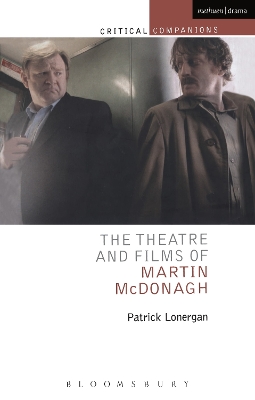Critical Companions
2 total works
Drawing on major new archival discoveries and recent research, Patrick Lonergan presents an innovative account of Irish drama and theatre, spanning the past seventy years. Rather than offering a linear narrative, the volume traces key themes to illustrate the relationship between theatre and changes in society. In considering internationalization, the Troubles in Northern Ireland, the Celtic Tiger period, feminism, and the changing status of the Catholic Church in Ireland, Lonergan asserts the power of theatre to act as an agent of change and uncovers the contribution of individual artists, plays and productions in challenging societal norms.
Irish Drama and Theatre since 1950 provides a wide-ranging account of major developments, combined with case studies of the premiere or revival of major plays, the establishment of new companies and the influence of international work and artists, including Tennessee Williams, Chekhov and Brecht. While bringing to the fore some of the untold stories and overlooked playwrights following the declaration of the Irish Republic, Lonergan weaves into his account the many Irish theatre-makers who have achieved international prominence in the period: Samuel Beckett, Siobhan McKenna and Brendan Behan in the 1950s, continuing with Brian Friel and Tom Murphy, and concluding with the playwrights who emerged in the late 1990s, including Martin McDonagh, Enda Walsh, Conor McPherson, Marie Jones and Marina Carr. The contribution of major Irish companies to world theatre is also examined, including both the Abbey and Gate theatres, as well as Druid, Field Day and Charabanc.
Through its engaging analysis of seventy years of Irish theatre, this volume charts the acts of gradual but revolutionary change that are the story of Irish theatre and drama and of its social and cultural contexts.
Irish Drama and Theatre since 1950 provides a wide-ranging account of major developments, combined with case studies of the premiere or revival of major plays, the establishment of new companies and the influence of international work and artists, including Tennessee Williams, Chekhov and Brecht. While bringing to the fore some of the untold stories and overlooked playwrights following the declaration of the Irish Republic, Lonergan weaves into his account the many Irish theatre-makers who have achieved international prominence in the period: Samuel Beckett, Siobhan McKenna and Brendan Behan in the 1950s, continuing with Brian Friel and Tom Murphy, and concluding with the playwrights who emerged in the late 1990s, including Martin McDonagh, Enda Walsh, Conor McPherson, Marie Jones and Marina Carr. The contribution of major Irish companies to world theatre is also examined, including both the Abbey and Gate theatres, as well as Druid, Field Day and Charabanc.
Through its engaging analysis of seventy years of Irish theatre, this volume charts the acts of gradual but revolutionary change that are the story of Irish theatre and drama and of its social and cultural contexts.
Martin McDonagh is one of the world's most popular dramatists. This is a highly readable and illuminating account of his career to date that will appeal to the legions of fans of his work for the stage and of his films Six Shooter and In Bruges. As a resource for students and practitioners it is unrivalled, providing an authoritative and enquiring approach to his work that moves beyond the tired discussions of national identity to offer a comprehensive critical exploration.
Lonergan provides a detailed analysis of each of his plays and films, their original staging, critical reception, and the connections within and between the Leenane Trilogy, the Aran Islands plays and more recent work. It includes interviews with directors, designers and actors associated with his work and material from Druid Theatre Company, the RSC and the National Theatre relating to the original productions. It offers four critical essays on key features of McDonagh's work by leading international scholars and a series of further resources including a chronology, glossary, notes on McDonagh's use of language and a list of further reading.
Lonergan provides a detailed analysis of each of his plays and films, their original staging, critical reception, and the connections within and between the Leenane Trilogy, the Aran Islands plays and more recent work. It includes interviews with directors, designers and actors associated with his work and material from Druid Theatre Company, the RSC and the National Theatre relating to the original productions. It offers four critical essays on key features of McDonagh's work by leading international scholars and a series of further resources including a chronology, glossary, notes on McDonagh's use of language and a list of further reading.

